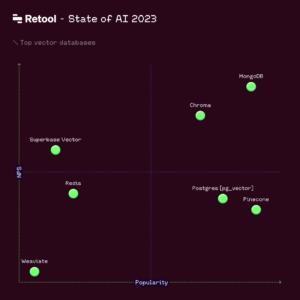Artificial intelligence, specifically generative AI (GenAI) has seen a meteoric rise in 2023. It initially gained popularity as a consumer tool, but is now being used by enterprises who are looking for different ways to harness its transformative power. We wonder whether businesses have been successful in integrating GenAI into their workflows to deliver improved customer experiences and reimagine business processes.
Retool, one of the leading development platforms for business software, just published its first-ever State of AI report to help us understand how technology professionals use and build AI, and which vector databases have been most successful. The report is based on a survey of 1,500 technology workers from various industries. The respondents include product managers, leadership, and software engineers.
“The AI revolution has been breathlessly covered but we’ve seen a lot less about use cases, especially in business,” said David Hsu, CEO and founder of Retool. “We did this survey and report because it won’t be possible to truly harness AI without first appreciating how it’s being used. What our findings make clear is that while AI isn’t replacing most technical jobs, it’s reshaping them—and people are latching onto the technologies that help them accelerate and strengthen their work.”
A key component of the report was to analyze the use of vector databases in businesses. The findings highlight MongoDB Atlas Vector Search had the highest Net Promoter Score (NPS), and was the second most widely used vector database, only behind Pinecone. Given that MongoDB Atlas Vector Search was released only five months ago, this is an impressive achievement.
The report also highlights that vector databases are more of a greenfield at this stage, as fewer than 20 percent of respondents are using vector databases, however, trends show the adoption is almost guaranteed to grow. There could be various reasons why the adoption rate for vector databases is still low. Some companies may lack the resources, others may not have the required specialized knowledge or understand the value of vector databases.
While it is early innings for vector databases, the DB-Engines trends show that in the last 12 months, vector databases are head and shoulders above all others in popularity. The primary reason for this surge in popularity is retrieval-augmented generation (RAG) architecture, which combines the reasoning capability of pre-trained LLMs with real-time data from companies. This allows for AI-powered apps designed to uniquely serve businesses for various objectives including driving internal productivity, reimagining customer experiences, and creating new products.
One of the key challenges with vector databases is that they have to integrate with other databases in the applications tech stack. Every additional database adds a layer of complexity and latency to the application. It also increases the operational overhead.
MongoDB offers a solution to this by allowing developers to store and search vector embeddings in the same system as the operation database and using a distributed architecture that can isolate different workloads while keeping data fully synchronized. In addition, developers can use MongoDB s dynamic document schema to model and evolve relationships between application data, vectors, and metadata. This unified approach allows for lower latency, higher-performing apps, and faster development cycles.
The Retool report reveals interesting findings about the use of AI in business. The C-suite executives are more optimistic about AI compared to individual contributors. Over 75 percent of survey respondents say their companies are making efforts to get started with AI, with 50 percent saying these are early-stage projects mainly geared toward Internet applications. The survey also highlights the top challenges for AI adoption are model output accuracy (40 percent) and data security (33 percent).
There is a long way to go for companies to fully harness the power of AI, but there is definitely a lot of interest across industries, and businesses are thinking about the possibilities and implications of AI technologies. We will have to wait and see what strategies companies use to get the most benefit from AI technologies.
Related Items
Oracle Introduces Integrated Vector Database for Generative AI
DataStax Rolls Out Vector Search for Astra DB to Support Gen AI
Vast Data Boosts AI Infrastructure with New Unified Data Platform
#AI/ML/DL #Slider:FrontPage #AIsurvey #DB-Engines #Retool #vectordatabases [Source: EnterpriseAI]



